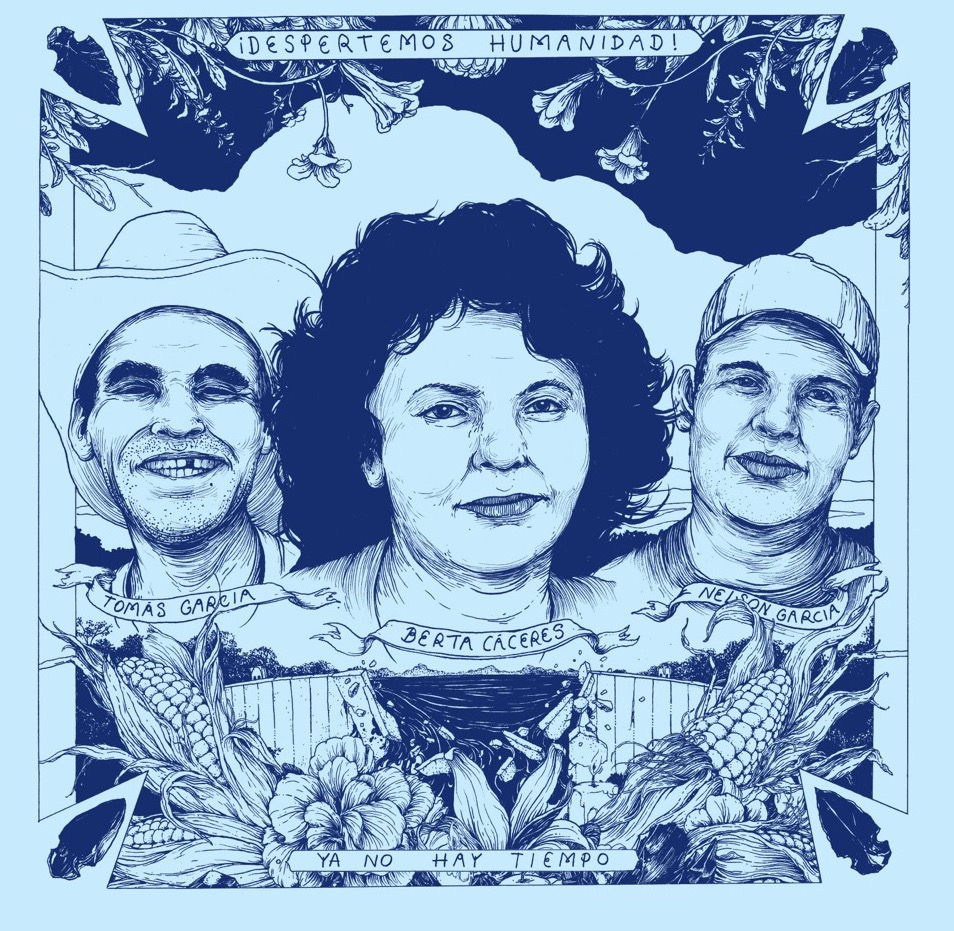On March 2, 2016, Indigenous leader Berta Cáceres, an organizer with the Lenca people’s resistance in Honduras, was murdered despite security measures that she had been granted given constant threats against her.
Today, in Ottawa, in response to the call from Berta’s family and her organization the Civic Council of Popular and Indigenous Organizations of Honduras (COPINH), and in the context of dozens of actions around the world, there will be a commemoration of Berta’s life from 7-9 pm at the Friends’ House (Quaker Meeting House, 91A Fourth Ave). We will reaffirm our commitment to never forget Berta, her analysis and her struggle, and to continue demanding that justice be done.
A year since her assassination, there have been various irregularities in the investigation into her case and the attempted murder of Mexican activist Gustavo Castro, sole survivor of the attack. Eight people have been arrested to date, including members of the Honduran army, retired military, and employees of the Development Energy Company S.A. (DESA), which owns the Agua Zarca hydroelectric project being carried out on Lenca territory without their consent. Berta Cáceres’ family, COPINH and Gustavo Castro have denounced the lack of transparency and evidence of manipulation during the investigation by government authorities.
Berta Cáceres is not the only victim of brutal repression of social movement leaders in Honduras.
“Since the June 2009 coup, those who speak out against injustice and human rights violations in Honduras face increasing risks and ongoing threats,” states Félix Molina, Honduran journalist who reported on the work of Berta Cáceres and the Lenca people, and who survived two attempts on his life last year.
In January, Global Witness published a report finding that there have been more than 120 environmental activists killed since 2009, making Honduras the most dangerous country to carry out such work. On March 15, 2016, two weeks after Berta Cáceres was murdered, Nelson García, another leader of COPINH, was killed. Only months later, in October, the general coordinator of COPINH, Tomás Gómez Membreño, suffered an attempt on his life.
Considering this context, various Canadian civil society organizations are circulating a solidarity declaration in support of COPINH that denounces technical and financial support that Canada is providing to the Honduran Attorney General’s office, arguing that this helps legitimate the context of impunity in which human rights violations are taking place. There are at least two high level officials in the Attorney General’s office with connections to the approval of the Agua Zarca project.
Please sign and share the online solidarity declaration here.
“Impunity in Honduras is not a problem of technical capacity, but rather a political problem. Canada’s continuing support provides political backing to an institution that lacks the will to clarify the facts behind the murders taking place,” remarks Karen Spring, Tegucigalpa-based coordinator for the Honduras Solidarity Network.
It is important to note that Canada has given largely unquestioning support to post-coup governments in Honduras since the November 2009 elections, which were widely denounced as fraudulent in Honduras and internationally.
“The Canada Honduras Free Trade Agreement, ratified in 2014, is yet another powerful tool for foreign investors in the context of already highly asymmetrical and repressive conflicts. Canadian investment has a strong presence in the mining, energy, telecommunications and tourism sectors in Honduras, and has been linked with abuses and threats against human rights defenders in several cases,” says Jen Moore for MiningWatch Canada.
During this election year in Honduras, diverse groups and solidarity networks are organizing around the world to denounce impunity in the country and the role of financial institutions and foreign governments. In the U.S., legislators first presented the Berta Cáceres Human Rights Act in June 2016, which aims to cease U.S. funding to the armed forces and police in Honduras, as well as to mega-projects that violate human rights. It will be presented once again this week.
Find more information about today's event in Montreal here. Sign and share the online solidarity declaration here.
Today, we join with many others to say: Berta was not killed, she multiplied!
Contacts:
- Ottawa: Jen Moore, MiningWatch Canada, 613-569-3439, jen(at)miningwatch.ca
- Montréal: Marie-Ève Marleau, Comité por los Derechos Humanos en América Latina (CDHAL), 514-358-2227, marie.eve(at)cdhal.org







